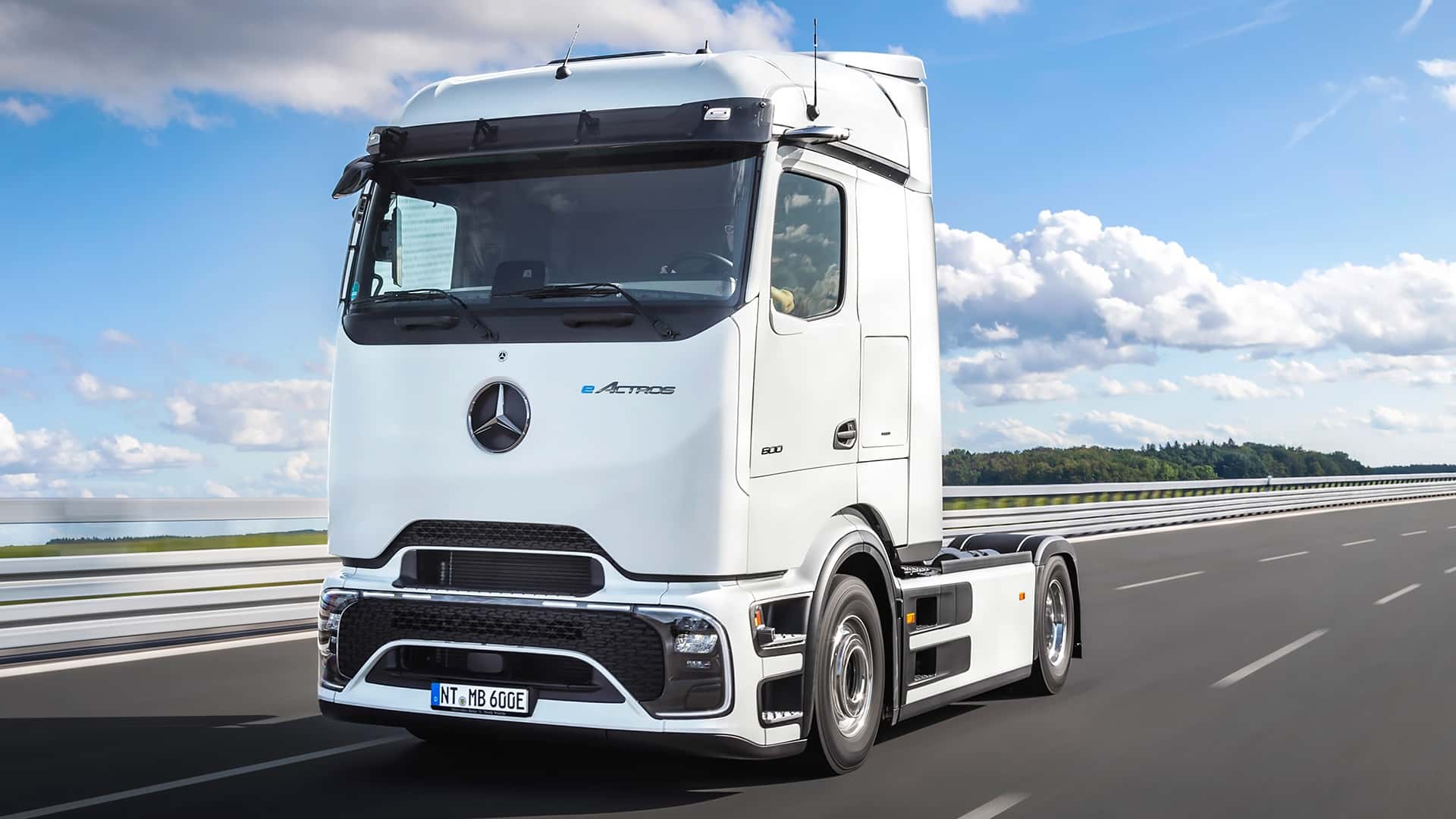The electrification of long-haul trucking: A game-changer for fleet electrification
Nov 06, 2023 · 6 min read · blog
The recent unveiling of the latest long-haul electric truck models by Mercedes-Benz and Volvo signals an acceleration in the transition to zero-emission freight transportation. The electrification of heavy-duty trucking has been a long time coming, but continued advancements in battery technology and charging infrastructure are poised to make it a reality. As major truck manufacturers roll out new all-electric models with increasing range capabilities, fleet operators now have the opportunity to significantly reduce emissions and lower costs by going electric.

The introduction of electric long-haul trucks signals a new era

The recent unveiling of the Mercedes-Benz eActros marks a pivotal moment in the electrification of commercial fleet vehicles. This fully-electric heavy-duty truck boasts ranges of up to 600 km on a single charge, demonstrating that electric propulsion can now viably power even the largest vehicles over vast distances. Here are the main takeaways from CleanTechnica’s article on the releases:

- Mercedes-Benz introduced the eActros 600 electric truck with a 600 kWh battery, offering a range of 500 km and the ability to travel 1000 km daily with breaks for charging.
- The eActros 600 is set to redefine electric long-haul vehicle standards, aiming at profitability and featuring a holistic solution for fleet operators including vehicle technology, consulting, and services.
- It utilizes LFP battery packs expected to retain 80% capacity after 10 years and is designed with advanced safety systems for better driver response to traffic conditions.
- Volvo Trucks revealed its SuperTruck 2, boasting a 134% increase in freight efficiency, part of the US Department of Energy’s initiative to enhance freight operations and representing future trends in long-haul truck design and technology.
- Although not electric, the SuperTruck2 will contribute to the development of future electric long-haul truck fleets through its increased efficiency.

The introduction of viable electric long-haul trucks signals an inflection point in the movement toward sustainable road freight transport - with a wide range of benefits for both the environment as well as human health.


Source: volvogroup.com

The benefits of electrifying long-haul trucking fleets

For long-haul trucking fleets, electrification offers significant environmental and economic benefits.

- Environmental benefits: Electrifying long-haul trucks will drastically reduce greenhouse gas emissions and pollution. According to the Environmental Protection Agency, heavy-duty trucks account for 23% of total transportation sector emissions in the US. Replacing diesel trucks with electric models can decrease nitrogen oxide emissions by up to 95% and eliminate particulate matter emissions completely. Widespread adoption of electric long-haul trucks will help meet sustainability goals and improve public health.
- Financial benefits: Fleet owners will also benefit financially from lower operating costs. Electric trucks have fewer moving parts so they require less maintenance, and the cost of electricity is more stable than diesel fuel, providing budget predictability. Government incentives, like tax credits, can also help offset higher upfront costs, and lifetime savings can mount up to $200,000 per truck.
- Operational benefits: Electric motors are more efficient than internal combustion engines. Electric trucks can convert over 85% of the energy from their batteries into power at the wheels, while diesel trucks only convert about 30% of the energy from fuel into useful work. The increased efficiency of electric trucks leads to lower energy usage overall.

While still an emerging technology, electric long-haul trucks are destined to transform the industry. Environmental and economic factors are accelerating the transition and the widespread adoption of these zero-emissions vehicles can significantly reduce pollution, lower costs, and support a more sustainable future for transportation - but not without challenges.


Source: insideevs.com

Overcoming challenges and pushing for innovation

The transition to fully electric long-haul trucking faces significant challenges that will require major investments in innovation and infrastructure to overcome.

- Infrastructure limitations: The current vehicle charging infrastructure cannot support large-scale electrification of long-distance freight transport. Heavy-duty trucks require high-powered chargers along routes to recharge their large battery packs. Building out a network of high-powered charging stations across major trucking corridors will require massive investments in grid upgrades and chargers.
- Higher upfront costs: Although lower fuel and maintenance costs can offset higher upfront costs over the lifetime of the vehicle, the initial purchase price of electric trucks remains significantly more than comparable diesel trucks, for example, the eActros’ purchase price is 2.5 times its diesel equivalent. Government incentives and subsidies will be needed to improve the business case for fleets to transition.
- Limited range: The maximum range of the latest electric trucks, around 200 to 400 km (125 to 250 miles) per charge, remains a barrier for long-haul routes. While sufficient for some short and medium-haul trucking, extended range options will be needed for fully electric long-haul freight. Continued improvements in battery technology and energy density will slowly help to overcome range limitations.
- Charging times: Long charging times, on the order of hours rather than minutes, reduce available driving and working time for truck drivers and fleets. Ultra-fast charging options, with charge times of 30 minutes or less for a full charge, are still limited. Additional research into fast and ultra-fast charging methods will be key to enabling long-haul electric truck adoption.

Overcoming these significant challenges will require major investments, incentives, research, and policy changes to support innovation in electric vehicles and charging technology specifically tailored to the needs of long-haul trucking. The future of sustainable trucking depends on a coordinated effort across private companies, government agencies, and research institutions to make all-electric long-haul trucking a reality.



Conclusion

As the transportation industry faces increasing pressure to reduce emissions and transition to renewable energy, the electrification of long-haul trucking is critical to meeting environmental goals and ensuring a sustainable future. The recent announcements from Mercedes-Benz and Volvo demonstrating all-electric semi-truck models are an encouraging sign of progress. The transition will not happen overnight, but with continued innovation, investment in infrastructure, and a shared commitment to decarbonization, all-electric long-haul trucking can become a reality.
